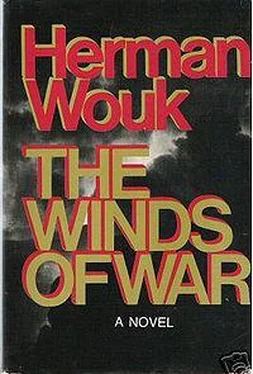Herman Wouk - The Winds of War
Здесь есть возможность читать онлайн «Herman Wouk - The Winds of War» весь текст электронной книги совершенно бесплатно (целиком полную версию без сокращений). В некоторых случаях можно слушать аудио, скачать через торрент в формате fb2 и присутствует краткое содержание. Год выпуска: 1971, Издательство: Collins, Жанр: Историческая проза, на английском языке. Описание произведения, (предисловие) а так же отзывы посетителей доступны на портале библиотеки ЛибКат.
- Название:The Winds of War
- Автор:
- Издательство:Collins
- Жанр:
- Год:1971
- ISBN:нет данных
- Рейтинг книги:4 / 5. Голосов: 1
-
Избранное:Добавить в избранное
- Отзывы:
-
Ваша оценка:
- 80
- 1
- 2
- 3
- 4
- 5
The Winds of War: краткое содержание, описание и аннотация
Предлагаем к чтению аннотацию, описание, краткое содержание или предисловие (зависит от того, что написал сам автор книги «The Winds of War»). Если вы не нашли необходимую информацию о книге — напишите в комментариях, мы постараемся отыскать её.
About the Author
Herman Wouk's acclaimed novels include the Pulitzer-Prize winning
;
;
;
;
;
; and
.
The Winds of War — читать онлайн бесплатно полную книгу (весь текст) целиком
Ниже представлен текст книги, разбитый по страницам. Система сохранения места последней прочитанной страницы, позволяет с удобством читать онлайн бесплатно книгу «The Winds of War», без необходимости каждый раз заново искать на чём Вы остановились. Поставьте закладку, и сможете в любой момент перейти на страницу, на которой закончили чтение.
Интервал:
Закладка:
“It’s a beautiful house,” Henry said in German.
Rosenthal glanced around with wistful affection, gestured to a chair, and sat down. “Thank you. We’re fond it, and have spent a lot of time and money on it.”
“Mrs. Henry and I feel awkward about leasing the place.”
“Why?” The Jew looked surprised. “You’re desirable tenants. If a lower rent would help -”
“Good lord, no! It’s an incredibly low rent. But will you actually receive the money?”
“Of course. Who else? It’s my house.” Rosenthal spoke firmly and proudly. “With the agent’s commission deducted, and certain municipal fees, I’ll receive every penny.”
Pug pointed a thumb at the front door. “Knödler told me that some new ruling compels you to rent it.”
“That won’t affect you as tenant. I assure you. Are you thinking of a two-year lease? I myself would prefer that.”
“But what’s this ruling?”
Though they were alone in an unoccupied house, Rosenthal glanced over one shoulder and then the other, and dropped his voice. “Well — it’s an emergency decree, you understand: I am sure it will eventually be cancelled. In fact I have been assured of that by people in high places. Meantime this property can be placed under a trusteeship and sold at any time without my consent. However, if there’s a tenant in residence with diplomatic immunity, that can’t be done.” Rosenthal smiled. “Hence the modest rent, Herr Commandant! You see, I’m not hiding anything.”
“May I ask you a question? Why don’t you sell out and leave Germany?”
The Jew blinked. His face remained debonair and imposing. “My family has a business here more than one hundred years old. We refine sugar. My children are at school in England, but my wife and I are comfortable enough in Berlin. We are both native Berliners.” He sighed, looked around at the snug rosewood-panelled library in which they sat, and went on: “Things are not as bad as they were in 1938. That was the worst. If there is no war, they’ll improve quickly. I’ve been told this seriously by some high officials. Old friends of mine.” Rosenthal hesitated and added, “The Führer has done remarkable things for the country. It would be foolish to deny that. I have lived through other bad times. I was shot through a lung in Belgium in 1914. A man goes through a lot in a lifetime.” He spread his hands in a graceful resigned gesture.
Victor Henry said, “Well, Mrs. Henry loves the house, but I don’t want to take advantage of anybody’s misfortune.”
“You’ll be doing just the opposite. You know that now. Two years?”
“How about one year, with an option to renew?”
At once Rosenthal stood and held out his hand. Henry rose and shook it. “We should have a drink on it perhaps,” said Rosenthal, “but we emptied the liquor closet when we left. Liquor doesn’t last long in a vacant house.”
It felt odd the first night, sleeping in the Rosenthals’ broad soft bed with its exquisite French petit-point footboard and headboard. But within a few days, the Henrys were at home in the mansion and busy with a new life. From an employment agency suggested by the agent came a maid, a cook, and a houseman-chauffeur, all first-rate servants, and — Henry assumed — all planted informers. He checked the electric wiring of the house for listening devices. The German equipment and circuits were strange to him, and he found nothing. Still, he and Rhoda walked on the lawn to discuss touchy matters.
A whirling couple of weeks passed. They saw Hitler once more at an opera gala, this time at a distance, up in a crimson damask-lined box. His white tie and tails were again too big, emphasizing his Charlie Chaplin air of a dressed-up vagrant, despite his severe stiff saluting and the cheers and applause of beautiful women and important-looking men, all stretching their necks to stare worshipfully.
At two receptions arranged for the Henrys, one at the home of the chargé and one at Colonel Forrest’s house, they met many foreign diplomats and prominent German industrialists, artists, politicians, and military men. Rhoda made a quick hit. Notwithstanding her panic before the chancellery reception, she had brought a large costly wardrobe. She sparkled in her new clothes. Her German kept improving. She liked Berlin and its people. The Germans sensed this and warmed to her, though some embassy people who detested the regime were taken aback by her cordiality to Nazis. Pug was something of a bear at these parties, standing silent unless spoken to. But Rhoda’s success covered for him.
Rhoda was not blind to the Nazi abuses. After her first walk in the Tiergarten, she refused to go back. It was far more clean, pretty, and charming than any American public park, she admitted, but the signs on the benches, JUDEN VERBOTEN, were nauseating. Seeing similar signs in restaurant windows, she would recoil and demand to go elsewhere. When Pug told her of his interview with Rosenthal, she had a deep attack of the blues: she wanted to forgo the house and even talked of getting out of Germany. “Why, imagine! Renting out that beautiful house for a song, just to keep it from being sold over his head — to some fat Nazi, no doubt, lying in wait to pick it off cheap. How horrible.” But she agreed that they had better take it. They had to live somewhere, and the house was divine.
Day by day, she reacted less to such things, seeing how commonplace they were in Berlin, and how much taken for granted. When Sally Forrest, who loathed the Nazis, took her to lunch at a restaurant where a window placard announced that Jews were not served, it seemed silly to protest. Soon she ate in such places without a second thought. In time, the Tiergarten became her favorite place for a Sunday stroll. But she insisted that anti-Semitism was a blot on an otherwise exciting, lovely land. She would say so to prominent Nazis. Some stiffened, others tolerantly smirked. A few hinted that the problem would straighten out in time. “I’m an American to the bone, going back six generations,” she would say, “and I’ll never see eye to eye with you on this business of the Jews. It’s absolutely awful.”
Most Germans seemed resigned to this independent, outspoken manner of American women and the way their husbands tolerated it; they regarded it as a national oddity.
Victor Henry stayed off the Jewish topic. Nazi Germany was a big, not readily digestible lump of new life. Most foreigners were strongly for or against the Nazis. The correspondents, as Kip Tollever had observed, hated them to a man. Within the embassy view varied. According to some, Hitler was the greatest menace to America since 1776. He would stop at nothing less than world rule, and the day he was strong enough, he would attack the United States. Others saw him as a benefactor, the only bulwark in Europe against communism. The democracies had shown themselves impotent against the spread of Bolshevist parties, they said. Hitler fought totalitarian fire with hotter and strong fire.
These judgments, either way, stood on slender bases of knowledge. Pressing his new acquaintances for facts, Victor Henry got vehement opinions and gestures. Statistics abounded in sheaves of analyses and reports, but too much of this stuff also came down to guesses, propaganda, and questionable paid intelligence. He tried to study German history late at night and found it a muddy tangle going back more than a thousand years. In it he could find no pattern and no guide at all to the problems of 1939. Just to figure out where the Nazis had come from, and what the secret was of Hitler’s hold on the Germans, seemed a task beyond him and beyond anybody he talked to; even the outlandish question of German anti-Semitism had a dozen different explanations, depending on which of any twelve Foreign Service men you asked. Commander Henry decided that he would grope uselessly if he tried to fathom these major matters in a hurry. Military capacity was something he knew about; it was a narrow but decisive aspect of Hitler’s Third Empire. Was Nazi Germany as strong as the ever-marching columns in the streets, and the throngs of uniforms in cafés, suggested? Was it all a show, no more substantial than the transparent red cheesecloth of the towering swastika banners? Deciding to take nothing for granted and to marshal facts for himself, Victor Henry dug into the job of penetrating this one puzzle.
Читать дальшеИнтервал:
Закладка:
Похожие книги на «The Winds of War»
Представляем Вашему вниманию похожие книги на «The Winds of War» списком для выбора. Мы отобрали схожую по названию и смыслу литературу в надежде предоставить читателям больше вариантов отыскать новые, интересные, ещё непрочитанные произведения.
Обсуждение, отзывы о книге «The Winds of War» и просто собственные мнения читателей. Оставьте ваши комментарии, напишите, что Вы думаете о произведении, его смысле или главных героях. Укажите что конкретно понравилось, а что нет, и почему Вы так считаете.












